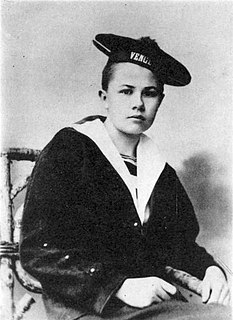A Quote by D.T. Suzuki
Zen, in its essence is the art of seeing into the nature of one's own being, and it points the way from bondage to freedom. By making us drink right from the fountain of life it liberates us from all the yokes under which we finite beings are usually suffering in this world.
Related Quotes
No matter what part of the world we come from, we are all basically the same human beings. We all seek happiness and try to avoid suffering. We have the same basic human needs and concerns. All of us human beings want freedom and the right to determine our own destiny as individuals and as peoples. That is human nature.
A subject to which few intellectuals ever give a thought is the right to be a vagrant, the freedom to wander. Yet vagrancy is a deliverance, and life on the open road is the essence of freedom. To have the courage to smash the chains with which modern life has weighted us (under the pretext that it was offering us more liberty), then to take up the symbolic stick and bundle and get out.
Nature consists of facts and of regularities, and is in itself neither moral nor immoral. It is we who impose our standards upon nature, and who in this way introduce morals into the natural world, in spite the fact that we are part of this world. We are products of nature, but nature has made us together with our power of altering the world, of foreseeing and of planning for the future, and of making far-reaching decisions for which we are morally responsible. Yet, responsibility, decisions, enter the world of nature only with us
Compassion allows us to use our own pain and the pain of others as a vehicle for connection. This is a delicate and profound path. We may be adverse to seeing our own suffering because it tends to ignite a blaze of self-blame and regret. And we may be adverse to seeing suffering in others because we find it unbearable or distasteful, or we find it threatening to our own happiness. All of these possible reactions to the suffering in the word make us want to turn away from life.
Only through art can we get outside of ourselves and know another's view of the universe which is not the same as ours and see landscapes which otherwise would remain unknown to us like the landscapes of the moon. Thanks to art, instead of seeing a single world, our own, we see it multiply until we have before us as many worlds as there are original artists.
Life is a hard fight, a struggle, a wrestling with the principle of evil, hand to hand, foot to foot. Every inch of the way is disputed. The night is given us to take breath, to pray, to drink deep at the fountain of power. The day, to use the strength which has been given us, to go forth to work with it till the evening.
Zen, like life, defies exact definition, but its essence is the experience, moment by moment, of our own existence -- a natural, spontaneous encounter, unclouded by the suppositions and expectations that come between us and reality. It is, if you like, a paring down of life until we see it as it really is, free from our illusions; it is merely a divestment of ourselves until we recognize our own true nature.
Every one is struggling for freedom-from the atom to the star. The ignorant man is satisfied if he can get freedom within a certain limit-if he can get rid of the bondage of hunger or of being thirsty. But that sage feels that there is a stronger bondage which has to be thrown off. He would not consider the freedom of the Red Indian as freedom at all.
Who can keep us from recreating our life as we would like it to be-as it could, and should be? No one but ourselves can keep us from being artists, rather than marching forward like mere consumers, corporate robots, sheep. No one but ourselves can keep us from dancing with life instead of goose-stepping. In every moment recognizing our own creative imagination, the living picture we paint on the canvas of our lives. Everything is imagination. And imagination is freedom, but it can also be conditioning, bondage.
































